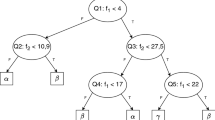Abstract
Decision tree ensembles, such as random forests, are well-known classification and regression methods with high accuracy and robustness, especially for categorical data that combines multiple weak learners called decision trees. We propose an architecture/algorithm co-design method for implementing fully parallelized fast decision tree ensembles on FPGAs. The method first produces compact and almost equivalent representations of original input decision trees by threshold compaction. For each input feature, comparisons with similar thresholds are merged into fewer variations, so the number of comparisons is reduced. The decision tree with merged thresholds is perfectly extracted as hard-wired logic for the highest throughput. In this study, we developed a prototype hardware synthesis compiler that generates a Verilog hardware description language (HDL) description from a compressed representation. The experiment successfully demonstrates that the proposed method reduces the sizes of generated hardware without accuracy degradation.
Access this chapter
Tax calculation will be finalised at checkout
Purchases are for personal use only
Similar content being viewed by others
References
Andrzejak, R.G., Lehnertz, K., Mormann, F., Rieke, C., David, P., Elger, C.E.: Indications of nonlinear deterministic and finite-dimensional structures in time series of brain electrical activity: dependence on recording region and brain state. Phys. Rev. E 64, 061907 (2001). https://link.aps.org/doi/10.1103/PhysRevE.64.061907
Breiman, L.: Bagging predictors. Mach. Learn. 24(2), 123–140 (1996). https://doi.org/10.1007/BF00058655
Breiman, L.: Random forests. Mach. Learn. 45(1), 5–32 (2001). https://doi.org/10.1023/A:1010933404324
Cheng, C., Bouganis, C.: Accelerating random forest training process using FPGA. In: 2013 23rd International Conference on Field Programmable Logic and Applications, pp. 1–7, September 2013
Cheng, C., Bouganis, C.: Memory optimisation for hardware induction of axis-parallel decision tree. In: 2014 International Conference on ReConFigurable Computing and FPGAs (ReConFig 2014), pp. 1–5, December 2014
Cortez, P., Cerdeira, A., Almeida, F., Matos, T., Reis, J.: Modeling wine preferences by data mining from physicochemical properties. Decis. Support Syst. 47(4), 547–553 (2009). https://doi.org/10.1016/j.dss.2009.05.016
Dua, D., Graff, C.: UCI machine learning repository (2017). http://archive.ics.uci.edu/ml
Jinguji, A., Sato, S., Nakahara, H.: An FPGA realization of a random forest with k-means clustering using a high-level synthesis design. IEICE Trans. Inf. Syst. E101.D(2), 354–362 (2018)
Little, M.A., McSharry, P.E., Roberts, S.J., Costello, D.A., Moroz, I.M.: Exploiting nonlinear recurrence and fractal scaling properties for voice disorder detection. BioMed. Eng. OnLine 6(1) (2007). https://doi.org/10.1186/1475-925X-6-23. Article no. 23
Mansour, Y.: Pessimistic decision tree pruning based on tree size. In: ICML 1997 (1997)
Nakamura, A., Sakurada, K.: An algorithm for reducing the number of distinct branching conditions in a decision forest. In: European Conference on Machine Learning and Principles and Practice of Knowledge Discovery in Databases (ECMLPKDD) (2019)
Struharik, R.: Decision tree ensemble hardware accelerators for embedded applications. In: 2015 IEEE 13th International Symposium on Intelligent Systems and Informatics (SISY), pp. 101–106, September 2015
Struharik, R.: Implementing decision trees in hardware, September 2011
Kulkarni, V.Y., Sinha, P.K.: Pruning of random forest classifiers: a survey and future directions. In: 2012 International Conference on Data Science and Engineering (ICDSE) (2012)
Yeh, I.C., Yang, K.J., Ting, T.M.: Knowledge discovery on RFM model using Bernoulli sequence. Expert Syst. Appl. 36(3), 5866–5871 (2009). https://doi.org/10.1016/j.eswa.2008.07.018
Author information
Authors and Affiliations
Corresponding author
Editor information
Editors and Affiliations
Rights and permissions
Copyright information
© 2020 Springer Nature Switzerland AG
About this paper
Cite this paper
Ikeda, T., Sakurada, K., Nakamura, A., Motomura, M., Takamaeda-Yamazaki, S. (2020). Hardware/Algorithm Co-optimization for Fully-Parallelized Compact Decision Tree Ensembles on FPGAs. In: Rincón, F., Barba, J., So, H., Diniz, P., Caba, J. (eds) Applied Reconfigurable Computing. Architectures, Tools, and Applications. ARC 2020. Lecture Notes in Computer Science(), vol 12083. Springer, Cham. https://doi.org/10.1007/978-3-030-44534-8_26
Download citation
DOI: https://doi.org/10.1007/978-3-030-44534-8_26
Published:
Publisher Name: Springer, Cham
Print ISBN: 978-3-030-44533-1
Online ISBN: 978-3-030-44534-8
eBook Packages: Computer ScienceComputer Science (R0)




